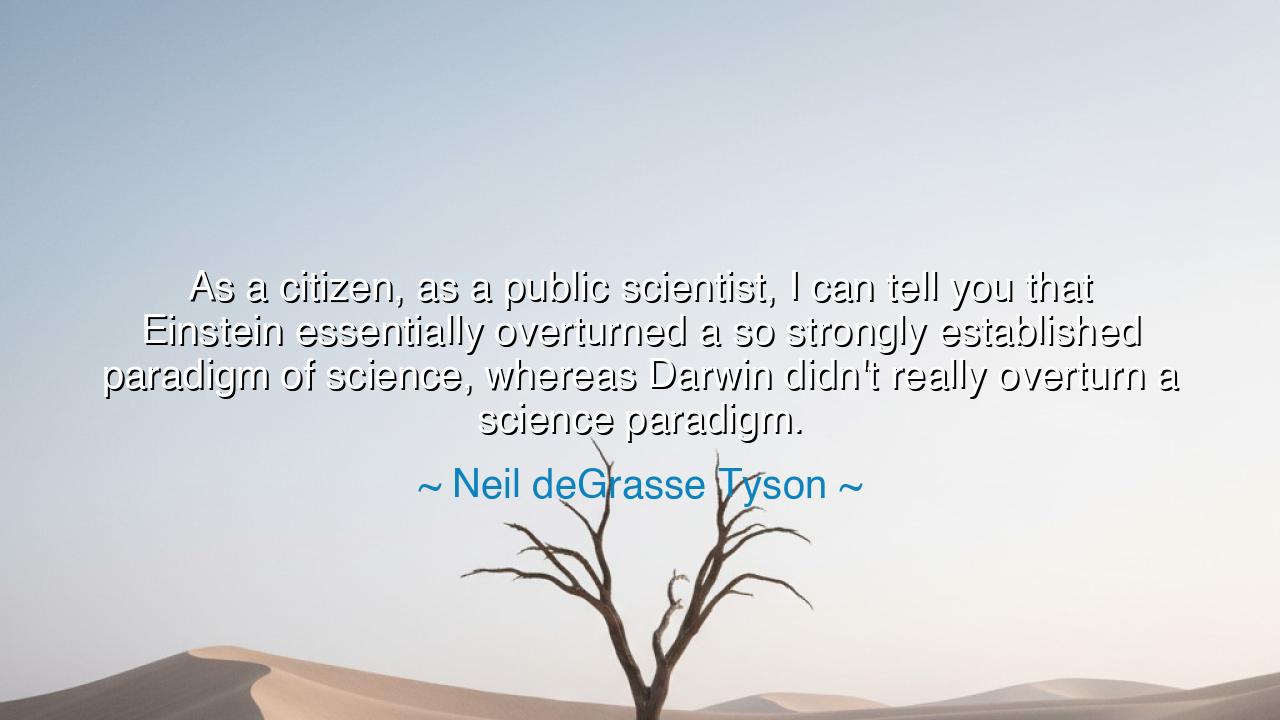
As a citizen, as a public scientist, I can tell you that Einstein
As a citizen, as a public scientist, I can tell you that Einstein essentially overturned a so strongly established paradigm of science, whereas Darwin didn't really overturn a science paradigm.






Listen closely, O seekers of truth, for the words of Neil deGrasse Tyson carry the weight of history and the profound insight into the nature of scientific progress. He said: “As a citizen, as a public scientist, I can tell you that Einstein essentially overturned a so strongly established paradigm of science, whereas Darwin didn’t really overturn a science paradigm.” These words may seem to contrast the revolutionary impacts of two of history’s greatest minds, but in truth, they reveal a deep understanding of how scientific revolutions unfold and how the course of human knowledge is altered.
What, then, is the meaning of this distinction, O children of wisdom? Tyson is drawing our attention to the difference between two monumental shifts in science. Albert Einstein’s theory of relativity revolutionized our understanding of space, time, and the very nature of the universe, overturning centuries of Newtonian physics that had been deeply entrenched in the scientific worldview. Einstein's theory did not merely expand our understanding—it redefined the very principles that had long been taken as immutable, shifting the paradigm of science itself. This was not simply a new discovery; it was the birth of a new way of thinking, one that altered the very foundation of physics.
In contrast, Charles Darwin did not overturn a paradigm in the same way. While Darwin’s theory of evolution through natural selection was indeed groundbreaking, it did not immediately displace an entire scientific framework. Before Darwin, the idea that species could change over time had been proposed, and while the theories of creationism dominated religious and cultural thought, the concept of evolution was not completely foreign. What Darwin did was to provide a unifying theory—the mechanism of natural selection—to explain how species evolved. Rather than displacing a central scientific doctrine, Darwin's work offered clarity and coherence to ideas that were already circulating within scientific circles, ultimately cementing the idea of evolution as a central principle of biology.
Consider the story of Einstein's journey into the unknown, where he challenged the assumptions of classical physics. Before Einstein, Newton's laws of motion had long served as the bedrock of physical science. For centuries, these laws had explained the movements of objects and the forces acting upon them with remarkable accuracy. However, Einstein’s theory of relativity shattered this seemingly unshakable foundation by showing that space and time were not absolute, but relative, depending on the observer's motion. The idea that time could stretch and compress, or that gravity could bend light, was so foreign to the scientific community that it seemed almost impossible. Yet, through his work, Einstein overturned a whole worldview and ushered in a new era of understanding that has shaped everything from space exploration to modern technology. This, O children, is the power of a paradigm shift—a complete reorientation of our fundamental beliefs about the nature of the world.
In contrast, Darwin’s theory of evolution did not radically uproot a fixed belief held by all. The idea of species change had been theorized by others before Darwin, such as Jean-Baptiste Lamarck. What Darwin did was provide a compelling mechanism—natural selection—that explained how and why species evolve. His work united disparate observations in geography, fossil records, and embryology into a coherent theory that could explain the diversity of life. Darwin’s theory didn’t upend existing frameworks as Einstein's did, but rather, it refined and expanded the scope of existing thought, creating a new foundation for the field of biology. Darwin’s impact, therefore, was in creating a framework that fit together the scattered pieces of evidence into a unified understanding of life on Earth.
The lesson here, O children of the future, is this: Revolutions in thought do not always require the complete destruction of old ideas. Sometimes, progress comes not through tearing down the old, but through building upon it. Darwin's theory did not overthrow the idea of change in nature—it shaped and refined it, making it a guiding principle in the study of life. Einstein’s revolution, however, demanded the rejection of a fundamental law that had long been accepted, fundamentally altering the scientific worldview. Both are crucial to human progress, showing us that science does not always progress through radical shifts, but often through careful, incremental change that builds on what has come before.
Therefore, O children, seek not only to challenge the established ways, but to also understand the process of progress. The paradigms of today will eventually give way to the ideas of tomorrow, but the path to knowledge is not always through destruction; sometimes it is through illumination—revealing deeper truths within what already exists. Like Darwin and Einstein, your task is to expand our understanding, to rethink the world around you, and to seek answers that may one day shift the course of history, whether through an overturning of beliefs or through the refinement of thought. In either case, the world will change, for the pursuit of truth and understanding is the force that shapes the future.






AAdministratorAdministrator
Welcome, honored guests. Please leave a comment, we will respond soon